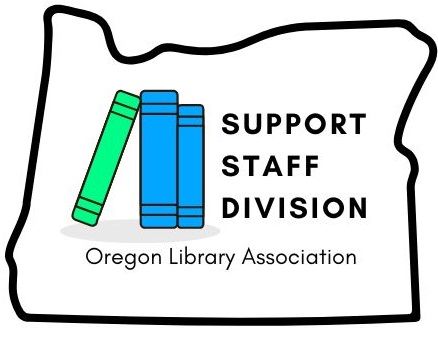|
SSD Archives
View Past Conference Materials on NW Central
OLA Support Staff Division 27th Annual Conference 2023
Find Our Way
July 20 and 21, 2023, Ashland Hills Hotel and Suites
Conference program designed by Sara Trott
OLA Support Staff Division 26th Annual Conference 2022
Rise Above
Friday, July 22, 2022, Timberline Lodge
Conference program designed by Sara Trott
COVID-19 cancelled the 2020 and 2021 conferences
OLA Support Staff Division 25th Annual Conference 2019
Transforming Together: Building a Better Library
Friday, July 16, 2019 in Clackamas, Oregon
OLA Support Staff Division 23rd Annual Conference 2017
Making Field Goals: Adapting and Thriving in Library Service
Friday, July 28, 2017 in Corvallis, Oregon
Conference poster designed by Jennifer Bosvert
Conference program designed by Emily Craft
OLA Support Staff Division 22nd Annual Conference 2016
Coming to a Crossroads: Intersecting Roads in Library Service and Community
Friday, July 15, 2016 in Wilsonville, Oregon
Conference program
OLA Support Staff Division 21st Annual Conference 2015
Friday, July 17, 2015 in Newport, Oregon
Bookmarks designed by Shanel Parette
The 2014 Conference was cancelled
OLA Support Staff Division Gateways Conference 2008
rejuvenate
Edit applicable to the article below. As of 2022, the portfolio option is suspended due to capacity of reviewers. It is unclear when or if this option will be restored.
Adventures in Library Land
CERTIFICATION: WHY BOTHER?
Since January, 2010 library support staff across America have had the opportunity to become certified. Despite the fact that this new opportunity will help with training and may lead to better salaries, employment opportunities, and improved morale, many support staff are resisting the idea of getting certified. This column is an attempt to respond to attitudes the author has encountered.
1. It costs too much money.
- The program designers knew we didn’t have any money and gave us an inexpensive option via the portfolio method. It is possible to work your way through the program without taking a single class. Where else can you get the equivalent of an Associate Degree for as little as $350? This is actually an incredible bargain. Yes, it would cost more if you chose to take classes, but financial help is available. SSD has up to seven $200 scholarships this year that could be applied towards the cost of certification. (You would have to join the Oregon Library Association and SSD to qualify, so there would be some cost there, if you aren’t already a member, but still...) I’m sure there are other sources of help available also, such as local staff training funds. You could ask if you could have a fund-raising drive at your library. Lack of money should not stand in the way of anyone who wants to be certified.
2. It’s just a job. I do my work and go home and have my real life. This isn’t worth it.
- OK, everything is fine. You don’t need more money; you don’t want more respect. If your boss puts you in a little box and won’t let you show what you could do, that’s OK, because it’s just a job. Ah, but in case everything isn’t quite perfect, remember certification offers a chance to cut your way out of many boxes. Unlike in-house training, an LSS certificate means that you have met a national standard of education, so you will be better prepared for other library opportunities or for advancement.
3. I work hard and I do a good job. Why isn’t that enough?
- This is a legitimate point of view. I have a little different perspective on this, however. I see a big-picture issue here. As long as your position description requires a high school diploma and a couple of years of experience, you aren’t going to get any real money. That’s how it is in any business organization. If we can get certification built into position descriptions, then we have a long-term chance of gaining tangible rewards. I know there are a lot of “ifs” here with a new program, but somebody has to make the first move. There’s also a little-picture perspective. So you do a good job. Could you do a better job if you had a refresher course in the library and took a look at a couple of different areas of the library outside of your department? I’ll bet you could. This is not about being good; it’s about being better.
4. My life is crazy right now – a second job, kids, aging parents, etc. I just can’t handle more
- Good luck. There are seasons in every life, and it sounds like this is not the season for you to get certified. I hope someday you’ll be able to try this.
5. I’m just hanging on until retirement.
- This perspective is understandable in someone who only has a couple of years to go. I think it is rather sad in someone who has 10, 15 or 20 years to go. I have 7-10 years to go until I retire, and I plan to get certified. Why? a.) I don’t want to get stereotyped as an old fogey. b.) I like to learn, and am confident that I’ll learn new things. c.) I believe in certification as a ”portable standard of excellence.” d.) After 30 years of working in libraries, complacency is the real enemy. I look forward to being humbled by what I don’t know.
6. I already have a degree.
- A degree shows that you have good communication skills, a foundation of knowledge, and that you know how to learn. But does it pertain to your work in the library? Does it help you keep up or refresh your skills? Are you paid more for having a degree? As long as a high school education is all that is required for library support staff positions, we will be paid like people with high school educations. One of my hopes for certification is to improve our compensation to better reflect the real skills library support staff have. Sometimes it takes the right piece of paper to do that.
7. I’ve never been to college, and all of this scares me.
- The portfolio method offers you a way to learn outside of the classroom, to cash in on your experience while growing new skills. There are creative ways to get through this; for example, could you “buddy up” with someone in your organization and get certified together? Could you start a study group? If English isn’t your native language, could you find some help with writing? (Note: our librarian routinely helps students who are writing their theses and dissertations – this is common in college settings, so don’t be shy about asking for help.) You could post questions to the libs-or or SSD electronic lists. Also, SSD will be working with the Oregon Library Association to assemble a list of potential resource contacts, librarians and supervisors, who want to help you work through the program. Such contacts could be very rewarding. You are not alone.
8. I’m uncomfortable with investing so much of my time and energy in this program when there are no guarantees.
- I know what you mean. At this point, nobody can make any promises. This is a new program that hasn’t yet been integrated into the workplace. If enough of us get certified -- and remember that new graduates of Library Technical Assistant programs from approved providers will be certified – then employers will have to deal with the reality of certification. The fact is that library support staffers are more powerful than we have ever been before, thanks to the Internet. The success of the latest selective increases for library technicians in the Oregon University System shows what we can do when we work together. A little band of activists got us this great opportunity. I wouldn’t want to bet against us.
-Susan Gilmont
|

